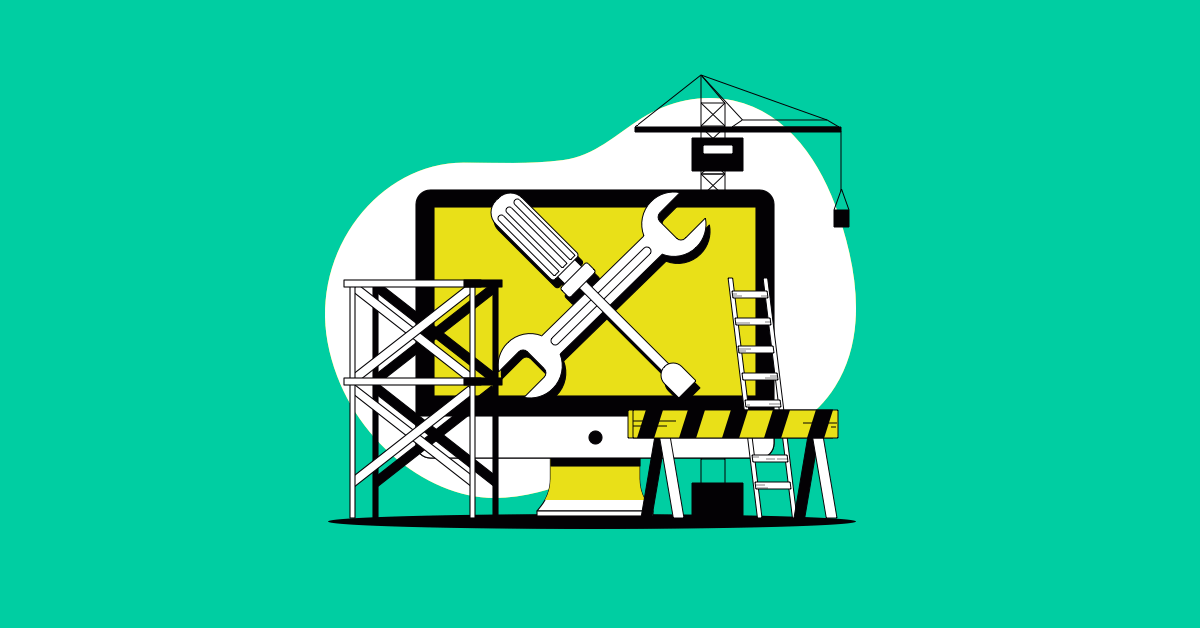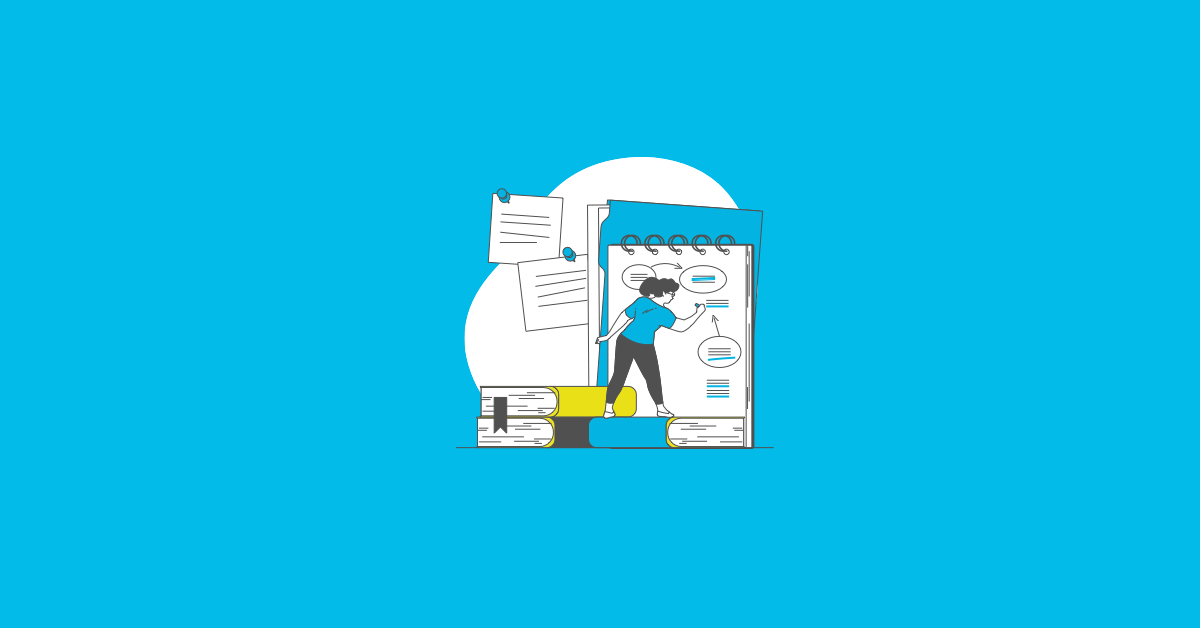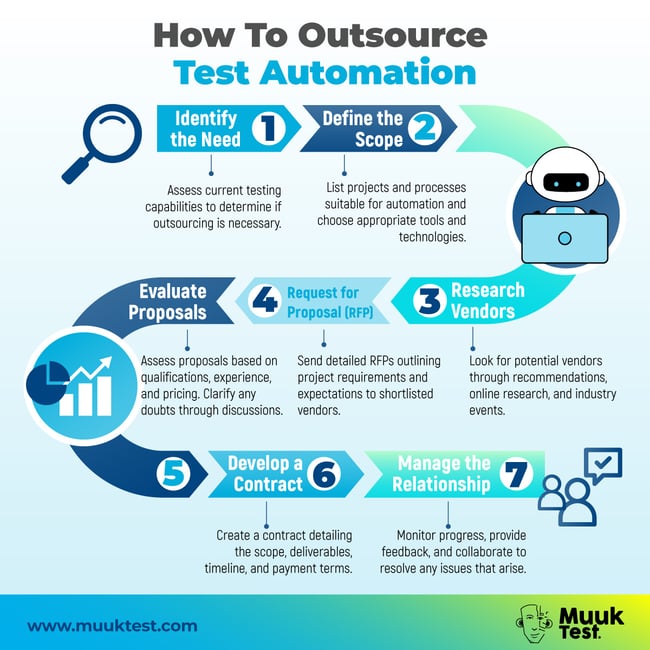Are you looking to implement test automation in your organization, but feel confused about where to start? If you’re worried about your team’s capacity and skill set, you’re in the right spot. Anyone who hears about the incredible feats of test automation will be motivated to attempt creating their own test automation suite. The catch here is, knowing where and when to start, as creating and maintaining the automation test suite for your organization can be exhausting. That’s where outsourcing the test automation process is helpful. While there are pros and cons, only you can decide whether or not it’s right for you.
In this blog we’ll explore the basics of outsourced test automation. From how companies could do it, the benefits of outsourcing the test automation process, and some crucial pointers to consider before adopting it.
What Does Outsourcing Test Automation Entail?
Outsourcing software test automation is the process of hiring a third-party vendor to perform automated software testing activities and delegating the testing process to an external service provider who specializes in test automation and has the necessary expertise, resources, and tools to efficiently and effectively conduct the tests. The chosen vendor helps us by creating, developing, and executing the automated tests for our projects/organization. This can be done for a variety of reasons, such as to reduce costs, to speed up the testing process, or to free up internal resources.
How To Outsource Test Automation?
There are a few key steps involved in outsourcing software test automation:
- Identify the need for outsourcing: The first step in the process is to identify the need or demand for outsourcing the test automation. To do this, we can assess the company's current testing capabilities and resources, and identify any areas where outsourcing could be useful. This detailed research helps us to proceed in the right way.
- Identify the Scope for Test Automation: Among the entire software testing process, take a list of projects/flows that could be automated. This defines the scope for the automation. Based on the scope we need to select the right tools and technologies.
- Researching and Identifying a Vendor: Once the need for outsourcing has been identified and the scope is finalized, we need to look out for vendors. There are various ways to identify and spot potential vendors in the industry. We can rely on recommendations from industry peers, do online research, and attend industry events and conferences. It is important to exhaustively research each vendor and their capabilities before shortlisting them.
- Sending “Request for Proposal”: From the shortlisted or potential list of vendors, we need to finalize the vendor by requesting proposals from multiple vendors and evaluating their qualifications, experience, and pricing. Create a detailed RFP with estimated project requirements, expectations, timelines, constraints, and budget. Vendors can evaluate this and they can send their proposals.
- Evaluating the Proposals: After receiving multiple proposals, we can evaluate based on our current needs, if this vendor can be fit for our project or organization. If there’s more clarification needed, it’s better to meet the vendors (either offline or online) and discuss more about the proposal and get the donuts clarified.
- Develop a contract. Once a vendor has been selected, we can proceed to develop a contract outlining the scope of work, the deliverables, the timeline, and the payment terms. This should contain all the potential details.
- Manage the relationship. Once the contract is signed and established, the next step is to manage the relationship with the vendor. This includes monitoring the vendor's progress, providing feedback, continuous collaboration, and resolving any issues that may appear.
Why Should Companies Outsource Test Automation?
There are several convincing reasons why companies should consider adopting outsourced test automation during the software testing process. These benefits include:
- Reduced costs: One of the primary benefits of outsourced test automation is its cost-effectiveness. We can compare the hiring costs and tool license and infrastructure costs. Companies can save money by outsourcing the testing process, which eliminates the need to establish an in-house testing team, hire and educate testers, and buy testing equipment and licenses.
- Reduced workload and increased team bandwidth: Improved quality of the overall software, since the in-house testing team could focus more on the critical features and give them enough time and freedom to perform exploratory time.
- Time-saving: Outsourcing can save a significant amount of time for companies. All the time spent on hiring the skilled testers, and training the existing team can be saved. By leveraging the expertise and experience of the outsourced team, companies can complete the testing process in a shorter time frame, allowing them to release their product to the market faster.
- Access to specialized skills and tools: Every team has different skill set, but imagine a team where there’s no tester experienced in automation. If there’s high time to implement automation, we cannot look out for all the specialized skills inside the team or force the team to learn where there’s not enough time. Outsourced test automation service providers have a team of skilled and experienced testers who are well-versed in using automated tools and techniques. Thus we get the diverse skills required for automation. These service providers have access to the latest testing tools and technologies, which may be too expensive for companies to acquire on their own.
- Increased flexibility and scalability: Outsourcing can help companies increase flexibility by allowing them to scale their testing resources up or down based on project demands without incurring extra costs. So as the project progresses, the testing requirements may change, and having the flexibility to ramp up or down the testing resources can help ensure timely and efficient delivery of the product. Additionally, outsourcing allows for greater scalability, meaning companies can easily adjust the testing needed.
- Increased testing coverage: With the help of automated testing tools, outsourced service providers can achieve a higher level of testing coverage compared to functional testing. This is because automated testing can be performed in a shorter amount of time and can simulate complex scenarios that would be difficult to test manually. This results in fewer missed defects and the team can focus on the business-critical flows.
- End-to-End Test Coverage: While adopting a vendor for automation, either it’s for front-end or API, the vendor platform could provide the end-to-end coverage, which is easier for maintenance
- Leveraging the overall Quality: By implementing diverse testing perspectives and different testing methodologies and tools, we can perform more comprehensive testing. This helps in early defect identification and avoids potential risks.
Cons of Outsourcing Software Test Automation:
- Initial costs: Outsourcing software test automation can be expensive initially, as organizations may have to pay for the services of an external vendor or consultant. This can be a barrier for smaller organizations or startups with tight budgets.
- Lack of control: By outsourcing, we give control of the testing process to an external party. This can result in a lack of control and visibility over the testing process, which may lead to communication issues and delays in identifying and fixing bugs.
- Communication challenges: When we go with outsourcing, there may be communication barriers due to time zone differences, language barriers, or cultural differences which result in misunderstandings, misinterpretations, and delays in the testing process.
- Security and Data Privacy Issues: Handing over sensitive data and code to an external party can pose security risks. Organizations should carefully vet and trust the vendor's security measures to ensure the safety and confidentiality of their data.
- Dependency on a single vendor: Outsourcing software test automation to a single vendor can create a single point of failure. If the vendor is unable to continue their services or faces financial issues, it can have a severe impact on the organization's testing process.
- Lack of domain knowledge: The outsourced team may not have sufficient domain knowledge of the software under test. This might limit their capability to test.

Conclusion
Every approach comes with its own set of advantages and disadvantages. So after doing thorough research, you can decide if outsourcing could help your software test automation for your project or organization.
Choose carefully considering the above pointers discussed, and if you decide that your project/organization can go for outsourcing test automation, good luck. Just enjoy the ride and build a long-term relationship with your vendor.
.png)



%20(1).png?width=150&height=69&name=MuukTest-logo---light-background%20(3)%20(1).png)


.jpg?width=1200&length=1200&name=06_carrousel-3_01%20(1).jpg)
.jpg?width=1200&length=1200&name=06_carrousel-3_02%20(1).jpg)
.jpg?width=1200&length=1200&name=06_carrousel-3_03%20(1).jpg)
.jpg?width=1200&length=1200&name=06_carrousel-3_04%20(1).jpg)
.jpg?width=1200&length=1200&name=06_carrousel-3_05%20(1).jpg)
